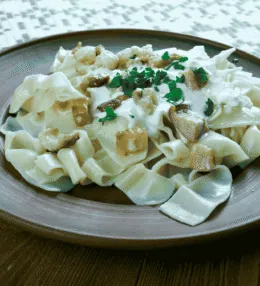
- View
Table of Contents
ToggleSkābeņu zupa, or sorrel soup, is one of those quietly comforting dishes that captures the soul of Latvian cooking. Often made with humble, foraged ingredients, it is a springtime favourite that signals the return of green after long Baltic winters. Earthy, tangy and deeply nourishing, this soup feels like home in a bowl.
Though simple at first glance, Skābeņu zupa is more than just a meal. It is a tradition passed through generations, rooted in the rhythm of the seasons and the countryside. Whether served at a rustic farmhouse table or enjoyed in a modern kitchen, this dish brings a sense of grounded familiarity.
Want to dive deeper into Latvian Cuisine? Don’t miss our post on 17 Traditional Latvian Foods to Try
What Is Skābeņu zupa?
Skābeņu zupa is a traditional Latvian soup made with fresh sorrel leaves, potatoes and often hard-boiled eggs or smoked pork. It has a distinctive tang thanks to the sorrel, which gives the dish its signature bright and slightly lemony flavour. The base is usually a light broth.
What makes Skābeņu zupa so memorable is how it balances sharpness with warmth. The sour notes from the sorrel are softened by the starchiness of potatoes and the richness of meat or eggs. It is not a flashy dish, but it lingers in your memory in the best possible way.
Ingredients and Taste
The foundation of this soup is fresh sorrel, a leafy green that grows in Latvian meadows and gardens. It brings a clean, sour tang that cuts through the richness of broth. Alongside it, you’ll find diced potatoes, sometimes carrots and onions, and slices of hard-boiled egg or bits of smoked meat.
The taste is refreshingly tart, with the sorrel’s acidity being its most striking feature. It wakes up the palate without overwhelming it. The eggs add creaminess, while potatoes provide a comforting bulk. If smoked pork is used, its savoury depth rounds out the flavour beautifully.
The result is a soup that’s both rustic and revitalising. It is especially loved in spring and early summer, when sorrel is young and tender. Eaten warm, it satisfies. Served cold, it refreshes. Either way, it is a true expression of the Latvian countryside.
A Taste of History
Skābeņu zupa has long been part of Latvian home cooking, especially in rural communities. Sorrel was traditionally foraged from the wild, making it one of the first fresh greens after winter. Its early growth made it ideal for springtime soups when pantry stores ran low.
In the past, sorrel soup was often prepared with what was on hand. If there was no meat, eggs would do. If dairy was available, a splash of sour cream might be stirred in. This adaptability helped the dish endure across generations, shaped by availability rather than strict rules.
Today, Skābeņu zupa remains a symbol of Latvian resourcefulness and connection to the land. It reflects a food culture built on respect for the seasons, for local ingredients and for the simplicity that comes from necessity. With each spoonful, it tells a story of resilience and renewal.

Latvian Skābeņu zupa (Sorrel Soup)
Ingredients
- 1 tablespoon unsalted butter
- 1 medium onion finely chopped
- 2 garlic cloves minced
- 2 medium carrots diced
- 2 medium potatoes peeled and cubed
- 1.5 litres chicken or vegetable stock
- 2 bay leaves
- 100 grams fresh sorrel leaves cleaned and chopped
- 4 large eggs
- 150 ml sour cream plus extra for serving
- Salt and freshly ground black pepper to taste
- Fresh dill chopped, for garnish
Instructions
- To begin, place a medium pot over medium heat and melt the butter. Add the chopped onion and sauté for 5 to 7 minutes until translucent and soft, stirring occasionally to prevent browning. This builds the soup's flavour base.
- Add the minced garlic and cook for 1 minute until aromatic. Stir in the diced carrots and continue to sauté for another 3 to 4 minutes. This helps to release their natural sweetness before simmering.
- Pour in the stock and bring to a gentle boil. Add the bay leaves and cubed potatoes. Reduce the heat to low and let the soup simmer uncovered for 20 minutes, or until the potatoes are fork tender. Skim the surface if foam appears.
- While the soup simmers, place the eggs in a separate pot and cover with cold water. Bring to a boil, then reduce to a gentle simmer for 10 minutes. Once cooked, transfer to a bowl of cold water to stop the cooking process.
- Peel the hard-boiled eggs once cool. Slice or halve them, depending on preference. Set aside as these will be added just before serving for optimal texture and presentation.
- Once the potatoes are tender, add the chopped sorrel to the pot. Cook for 3 to 5 minutes until wilted and soft. Sorrel cooks quickly and will turn a deep green with a pleasant sour note.
- Lower the heat and stir in the sour cream. Mix gently until the soup takes on a creamy consistency. Do not boil after adding the sour cream, as it may curdle. Adjust seasoning with salt and pepper to taste.
- Remove and discard the bay leaves. Allow the soup to rest for 5 minutes off the heat. This short resting period allows the flavours to meld and deepen without overcooking the delicate sorrel.
- To serve, ladle the soup into bowls and place a sliced or halved egg into each serving. Garnish with fresh dill and a dollop of sour cream if desired. Serve with dark rye bread for a rustic, traditional touch.
Nutrition
You May Also Like









Leave a Review